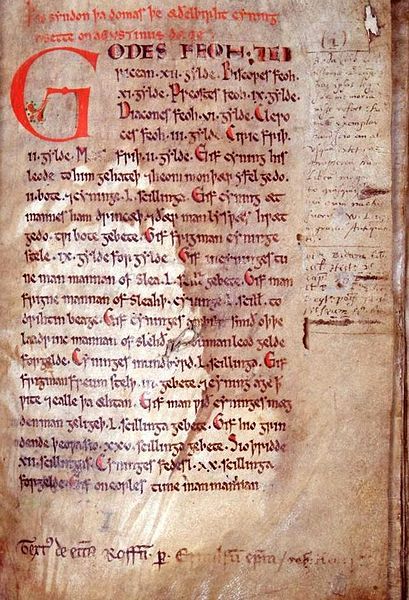Who better to explain the English legal system than Harry Potter? No, he’s not a trainee warlock, but a barrister, and not an English one either.

The Strange Case Of The Law is presented by Harry Potter; in case you are tempted to confuse him with a slightly more famous person of the same name, you can learn a bit about this prison chaplain turned barrister here.
Although Potter himself (perhaps we should call him Counsel?) is based in London, he begins his story with a visit to Rochester where he shows the viewer a document dating from the 6th Century which is believed to be the earliest surviving and perhaps the earliest per se relating to the English legal system. It is this that he identifies as the beginning of what has become known as the compensation culture, which is widely attributed to contemporary America. The document dates from the reign of Æthelberht of Kent – King Ethelbert – in what was then the Kingdom of Kent.
The earliest courts – shire courts for serious cases – were held outdoors and were decided by swearing oaths. If you were accused of arson or murder, and could produce 36 witnesses to your good character, you were off the hook. At that time, no distinction was made between criminal law and civil law; the shire court system expanded across the country, and became what we know now as county courts – for civil matters.The first centre of English law was located at not as you might suspect London, but Winchester.
In the 10th Century, Æthelstan – king of all England – minted the first coin to be used throughout the country, and with it a number of legal codes. Nowadays, banks create money out of thin air, a crime many regard (rightly) as forgery. Best not to be caught forging coins in King Athelstan’s day! By this time, the enforcement of law for serious crimes in England was in the hands of the king (the Crown), where it remains to this day.
Potter traces the development of trial by ordeal and combat, the latter included civil cases. The Norman Conquest changed nothing, but law and order broke down with King Stephen, the grandson of William the Conqueror. It was Henry II who became the father of the English common law, founding the system of assizes (which were replaced by Crown Courts in the late 20th Century). By this time, the centre of law had moved to the City of Westminster (London).
Henry’s reforms led to the writing of law books and the system of common law, ie the use of precedents for judging future cases. Henry’s son, John, was not much of a monarch, and this led to the barons forcing on him the Magna Carta, which Potter considers to be the most important legal document in history. It was this that led England along the route of trial by jury while the rest of Europe chose more unsavoury means, including torture. Magna Carta was used as the basis of that other great legal document, the US Constitution.
Potter ends this first episode in London; his view is that the English common law is our greatest gift to the world. He might be right, aside from English itself that is, the lingua franca of the known universe. And then some!
[The above review was first published June 22, 2012.]
Back To Digital Journal Index